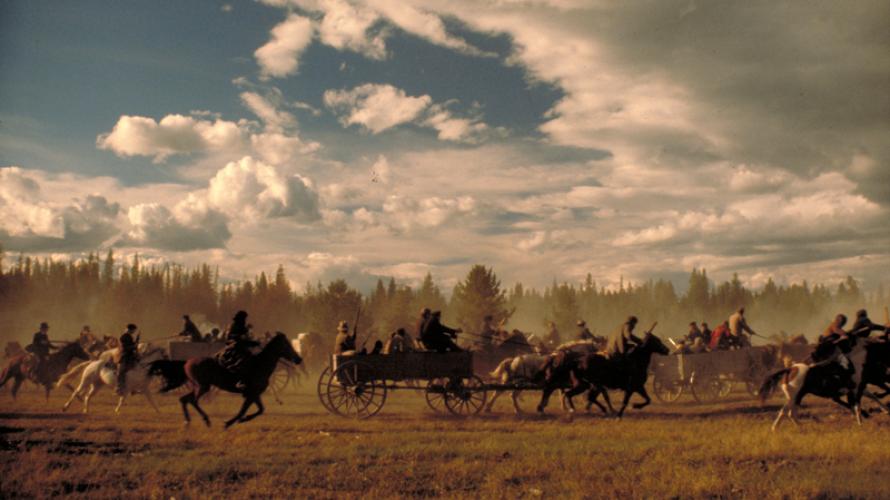
 Joseph Shelton is a freelance writer who graduated from Montana State University with a degree in English Literature. He lives in Bozeman, where he enjoys hiking, reading, and being a misunderstood artist-type.
Joseph Shelton is a freelance writer who graduated from Montana State University with a degree in English Literature. He lives in Bozeman, where he enjoys hiking, reading, and being a misunderstood artist-type.
*****
Astute reader Michael Knapp emailed me after reading the "Lights, Camera, Montana" article to point out that I had failed to mention "Heaven's Gate", the almost legendary 1980 flop from director Michael Cimino. It was filmed around Kalispell, Glacier National Park, on a Blackfeet Indian Reservation and other shooting locations around Montana and the world and is one of the most divisive and storied films ever shot in Montana. I chose to omit it from the article because I thought I would end up writing about it the whole time rather than touching on the other films. But it really is an omission that bears fixing, so here is a word on that famous, troubled film.
While acknowledging that it was "probably the first western to celebrate the role played by central and eastern Europeans in the settlement of the American West", the experience of watching "Heaven's Gate" it was still judged by New York Times critic Vincent Canby to be "like a forced, four-hour walking tour of one's own living room". He wasn't alone. In fact, contemporary critics were so gleefully denigrating that critic/historian Robin Wood said that each was trying to "outdo [the] other with sarcasm and contempt". It also didn't help that there were persistent rumors that horses and other animals were severely injured on the set, which could not be proved or disproved since the American Humane Association was barred access to the set.
The movie also left its mark on the Studio system in Hollywood, and quite arguably rained on the parade of a whole generation of filmmakers. Previous to the 1980 megaflop Hollywood studios were giving more and more power to a younger generation of filmmakers, many of whom were some of the first to graduate with degrees in film. This was partially because of the rise of a auteur theory in film criticism, that is the belief that a movie is more or less the authorial work of the director. While perhaps not giving enough credit to the numerous craftspeople who work on a film, it did however encourage risky investments in untested directors. Works like "The Last Picture Show", directed by Peter Bogdanovich, "American Graffiti" by George Lucas, and "The Deer Hunter" by "Heaven's Gate" director Michael Cimino, were all successful films. It looked for the first time in the industry as if an artistic, rather than commercial, model would work for the studios.
With a then-monolithic budget of $44 million, and an endless series of re-shoots and re-edits, the movie finally was released into theaters. The original cut performed so poorly in Los Angeles theaters that United Artists pulled it from the theaters after only a week. Then, after a much shortened version was cut in 1981, it was again re-released to no particular acclaim. Ultimately, it grossed around $3.5 million, which gave the studio a very poor return. United Artists, already reeling after several flops, was bought out by MGM.
The result, some film historians will hold, was that "Heaven's Gate", a straw of not inconsiderable size, shattered the Camel Of Auteur-Driven Cinema's back. The rise of high concept genre thrillers like "Jaws" (1973), "Close Encounters of the Third Kind" (1977) and "Alien" (1979) were much safer bets for the Studios' money. They -- and their sequels, video game adaptation, novelizations, posters, toys, games, stuffed animals, and assorted plastic ephemera -- would change Hollywood to this day. Now the average Summer blockbuster is about twice as expensive as "Heaven's Gate" was back then. And that's after the budget for "Heaven's Gate" was adjusted for inflation. In other words, Hollywood is spending even more money on even bigger productions than 1980's "Heaven's Gate", they're just not letting much artistic control over the films, ensuring that the robot fights and alien invasions are presented in a commercially wholesome manner.
Subsequent reassessments of the film are kinder. It is recognized for being a film of hugely audacious ambition, and an important film about the darker side of the settling of the American West. As it finally enjoys its renaissance, "Heaven's Gate" earns its place among the most singular Hollywood films ever produced. As is true of nearly all the movies shot in Montana, its scenery is astonishingly beautiful, and its Oscar-nominated cinematography skillful and eery. A recent final directors cut is available on DVD on the Criterion Collection, and is encouraged to potential viewers as the most complete cut currently available.
--
